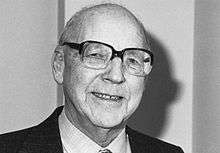Frederick Dainton, Baron Dainton

Frederick Sydney Dainton, Baron Dainton FRS[1] FRSE (11 November 1914 – 5 December 1997) was an English academic chemist and university administrator.
A graduate of Oxford and Cambridge, he was Professor of Physical Chemistry at the University of Leeds, Vice-Chancellor of the University of Nottingham, Professor of Chemistry at Oxford and Chancellor of the University of Sheffield. He was elected a fellow of the Royal Society in 1957 (Davy Medal 1969, Faraday Medal 1974), knighted in 1971 and was elevated to a life peerage as Baron Dainton, of Hallam Moors in the County of South Yorkshire in 1986.
Life
Dainton was born in Sheffield on 11 November 1914, the son of George Whalley Dainton (born 1857), a Clerk of Works to a building contractor, and his second wife Mary Jane Bottrill,[2] as the youngest of nine children.[3] He obtained a scholarship to the Central Secondary School in Sheffield, but it was in the public library that he became enthused of chemistry by reading the books of Sidgwick and Hinshelwood. He won an Exhibition at St. John's College, Oxford with a supplementary grant and loan from the City of Sheffield, which enabled him to study chemistry,[3] gaining a first class degree in 1937.[4]
He then moved to Cambridge working on photochemistry under Norrish.[3] Being short-sighted he was unfit for military service, and stayed to teach at Cambridge during the Second World War. It was during this period that he met and in 1942 married a zoology research student, Barbara Hazlitt Wright (died 12 April 2009). They were married for 55 years, and had a son and two daughters.[3]
In 1950 he became Professor of Physical Chemistry at Leeds, specializing in radiation chemistry; work which resulted to his election to Fellow of the Royal Society in 1957.[3] From 1965 to 1970 he was Vice-Chancellor of the University of Nottingham.[3] During this period he chaired Government enquiry into the decline in university entrants in science and technology, published in 1968 as 'The Swing away from Science', and generally known as the Dainton Report.[4] He was awarded an Honorary Degree (Doctor of Science) by the University of Bath in 1970.[5]
In 1970 became Professor of Chemistry at Oxford, relinquishing this in 1973 to become Chair of the University Grants Committee (UK), a position he held until 1985.[4] In 1970 he became the second chairman of the Council for Scientific Policy. In 1971 he was knighted and in 1986 made a life peer, Baron Dainton of Hallam Moors.[4] From 1978 until his death he was the Chancellor of the University of Sheffield, the first Yorkshireman to hold this post.[4]
He was elected a Fellow of the Royal Society in 1957 and in 1996 he was elected an Honorary Fellow of the Royal Society of Edinburgh.[6]
He died in Oxford on 5 December 1997.[2]
Publications
- Science: Salvation or Damnation (1971)
- Doubts and Certainties: A Personal Memoir of the 20th Century (2000)
References
- ↑ Gray, P.; Ivin, K. J. (2000). "Frederick Sydney Dainton. 11 November 1914 -- 5 December 1997: Elected F.R.S. 1957". Biographical Memoirs of Fellows of the Royal Society 46: 85. doi:10.1098/rsbm.1999.0075.
- 1 2 https://www.royalsoced.org.uk/cms/files/fellows/biographical_index/fells_indexp1.pdf
- 1 2 3 4 5 6 "Royal Society of Edinburgh : Obituary" (PDF). Rse.org.uk. Retrieved 16 December 2014.
- 1 2 3 4 5 University of Sheffield. "Dainton Papers". Shef.ac.uk. Retrieved 16 December 2014.
- ↑ "Honorary Graduates 1966 to 1988". Bath.ac.uk. Retrieved 16 December 2014.
- ↑ https://www.royalsoced.org.uk/cms/files/fellows/biographical_index/fells_indexp1.pdf
| Academic offices | ||
|---|---|---|
| Preceded by Bertrand Hallward |
Vice-Chancellor of the University of Nottingham 1965–1970 |
Succeeded by John Butterfield |
| Preceded by Rab Butler |
Chancellor of the University of Sheffield 1978–1997 |
Succeeded by Peter Middleton |
|